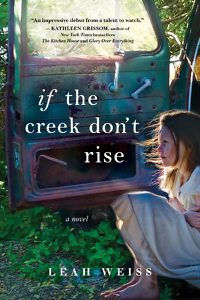There are ten narrators in Leah Weiss’s debut novel, If the Creek Don’t Rise. At times, the story reads like an Appalachian Rashomon, with multiple voices describing similar events in very different ways. Most are long-time residents of Baines Creek, North Carolina—a place which is “barely a crossroads, a dot on a map.” The year is 1970, and into this impoverished landscape of moonshiners, ginseng hunters, violent men, and hardened women, comes Kate Shaw, a six-foot, two-inch schoolteacher. She’s a liberal, a feminist, an agnostic, and a rebel. She’s also “looking for a place to matter.”
 The first person Kate meets is the preacher’s sister, Prudence: “The charcoal lids of her eyes are sunken. Her neck is creased with grime, her nails caked to the quick with dirt, her shapeless dress little more than a rag. One shoe is tied with a strip of cloth to keep the sole from flapping. This is poverty the likes of which I’ve never imagined except in the books of Dickens and the Brontë sisters,” Kate says. Prudence is even less impressed with Kate: “She’s a long-legged giant of a woman who’s got on man’s trousers, for Lord’s sake! Her hair’s chopped off, too. She’s an insult to womankind is what she is.” If Prudence has her way, she and her fellow Crusaders for Moral Fortitude will run Kate Shaw right out of Baines Creek.
The first person Kate meets is the preacher’s sister, Prudence: “The charcoal lids of her eyes are sunken. Her neck is creased with grime, her nails caked to the quick with dirt, her shapeless dress little more than a rag. One shoe is tied with a strip of cloth to keep the sole from flapping. This is poverty the likes of which I’ve never imagined except in the books of Dickens and the Brontë sisters,” Kate says. Prudence is even less impressed with Kate: “She’s a long-legged giant of a woman who’s got on man’s trousers, for Lord’s sake! Her hair’s chopped off, too. She’s an insult to womankind is what she is.” If Prudence has her way, she and her fellow Crusaders for Moral Fortitude will run Kate Shaw right out of Baines Creek.
The second person Kate meets is Sadie Blue Tupkin, the abused and pregnant wife of ne’er-do-well Roy Tupkin. Orphaned in childhood, Sadie has only had her grandmother and aunt for guidance. They both tried to warn her about Roy, but she didn’t listen: “Granny said, back then, through pinched lips and squinty eyes and hissy voice, ‘You knock them fake stars outta your blind eyes, Sadie Blue, or you gonna lay with the devil and live in hell. When that happens, I can’t help you,’” Sadie remembers. “I thought she was jealous cause I was happy. I thought I was smart and loved a bad man turned good. I’ve been on a losing streak a long time.”
 Almost every chapter of If the Creek Don’t Rise offers a new narrative voice, complete with a distinct dialect and life experience. It’s a narrative strategy that makes the Appalachian people of the era come alive. In their voices, “wasn’t,” “weren’t,” and “wouldn’t” all become “won’t,” and the book’s descriptions are vivid and to the point. Sadie’s mother “had gumption in her eyes and a slice of selfish that won’t pretty.” Sadie’s grandmother laments that “from the start there’s been a film of dingy on my days.” But Sadie’s aunt sees blessings all around her, “even when it’s a speck that shines in a gray sea of sad.” And a sadder, wiser Sadie now knows herself to be “a fool hanging hope on a weak man I thought would stand tall if we got married.”
Almost every chapter of If the Creek Don’t Rise offers a new narrative voice, complete with a distinct dialect and life experience. It’s a narrative strategy that makes the Appalachian people of the era come alive. In their voices, “wasn’t,” “weren’t,” and “wouldn’t” all become “won’t,” and the book’s descriptions are vivid and to the point. Sadie’s mother “had gumption in her eyes and a slice of selfish that won’t pretty.” Sadie’s grandmother laments that “from the start there’s been a film of dingy on my days.” But Sadie’s aunt sees blessings all around her, “even when it’s a speck that shines in a gray sea of sad.” And a sadder, wiser Sadie now knows herself to be “a fool hanging hope on a weak man I thought would stand tall if we got married.”
Perhaps the most poignant memory in the novel belongs to Sadie’s aunt, who remembers arriving in Baines Creek from the coal country of West Virginia after her brothers are killed in a mine accident: “What I saw for the first time was colors,” she says. “At ten years old, I had to learn my colors like a baby cause I don’t know a single one. There was greens and yellows and reds. But it was the blue sky and white clouds that tickled me most. They was pure is what they was, and surely a peek at heaven. I wish my brothers coulda seen colors.”
But the most vivid character in this vividly drawn novel is Birdie Rocas, an enigmatic local healer pulled, one way or another, into the lives of all the other characters. She’s a complicated woman, bedraggled in appearance (a pet crow nests in her hair), but Birdie’s “Books of Truths” contains the history of Baines Creek—and its conscience. “For my kind of stories, I don’t sit round the fire spinning yarns and giving goose bumps,” she says. “What I do is collect truth that bends easy if you won’t careful, and I write it down in my book where it stays put,” she says. Like Birdie, Leah Weiss has collected some unique truths in If the Creek Don’t Rise, and they are sure to stay put in readers’ imaginations long after her story is done.

A graduate of Auburn University, Tina Chambers has worked as a technical editor at an engineering firm and as an editorial assistant at Peachtree Publishers, where she worked on books by Erskine Caldwell, Will Campbell, and Ferrol Sams, to name a few. She lives in Chattanooga.
Tagged: 2017 Southern Festival of Books, Fiction





